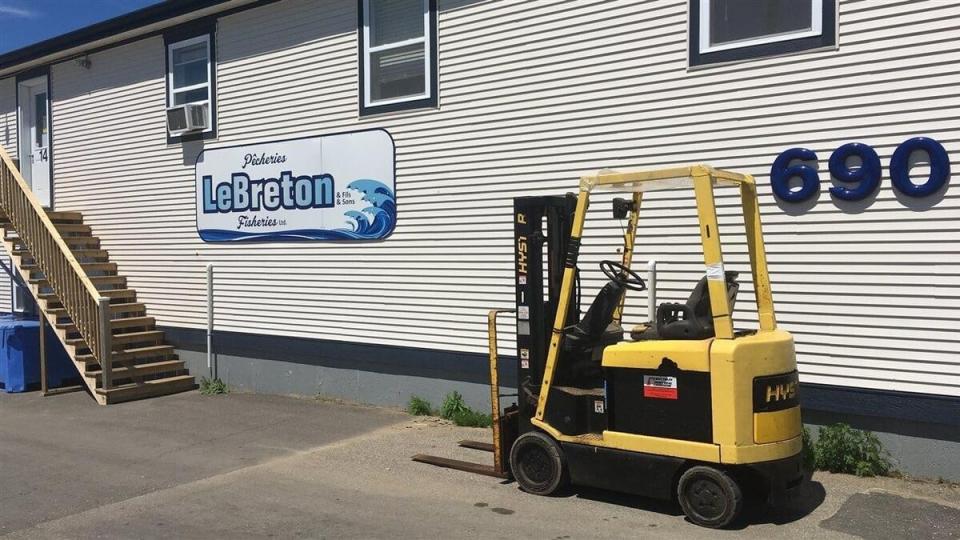Lobster plant fined $350k, banned from hiring foreign workers for 2 years

A lobster processing plant in northeastern New Brunswick has been fined more than $365,000 and banned from hiring temporary foreign workers for two years.
LeBreton Fisheries in Grand-Anse, on the Acadian Peninsula, was previously fined $30,000 for failing to provide a work environment free of harassment and reprisal.
In a decision made in April, Immigration Canada found that the employer violated the same rule again and four new ones.
It found that pay or working conditions did not match the workers' contracts, that LeBreton Fisheries broke federal or provincial hiring and recruiting laws, that it didn't make information about workers' rights available in both official languages, and it did not keep documents for the required amount of time.
The department does not make public how many workers were affected, when the offences happened or how the investigation was conducted.
The fine is the highest one levied against a New Brunswick employer of temporary foreign workers, according to the federal non-compliance database. The second highest fine was LeBreton's previous one.
Kevin LeBreton, one of the owners, said these sanctions are unjustified and the company is evaluating its legal options.
He said no foreign workers were hired this year before the ban was instated and the company plans to find locals to work through the season.
Workers spoke out
Last summer, a worker spoke publicly about the working conditions and reprisals he said he faced at the fish plant. At the time, the 80 workers from Mexico and the Philippines were sent home two months before their contract was to end. The company said a slow season was to blame.
The worker, Francisco Javier de Dios, was able to get an open one-year work permit and is still in New Brunswick.
"The ones who stayed, we who made complaints, our open work permit for vulnerable workers will expire soon and we will be forced to leave or become undocumented; how is this fair? We deserve permanent resident status now," he said in a statement.
The advocacy group Migrant Workers Alliance for Change was working to support some of the employees.
Syed Hussan, the executive director of the organization, said since the summer, three LeBreton workers have stayed in Canada after receiving an open work permit for vulnerable employees.
These work permits are only available to temporary foreign workers who are "being abused or at risk of being abused" in relation to their job in Canada, according Immigration Canada's website.

Last year, Francisco Javier Montaño de Dios said he was terminated with two more months left of his contract at Lebreton Fisheries. Because of the way the temporary foreign worker complaint system works, it is not known if his experiences with the company contributed to the fine. (CBC/Canadian Press)
Karina Perez worked at LeBreton and said she was "forced to leave for Mexico" because she spoke up against working conditions.
"There are so many of us, not just because of this one employer, who has not returned to Canada because we spoke up," she said.
Hussan said because of the way the system is set up, it is impossible to know for sure whether this fine was a result of these employees' complaints. He said when a temporary foreign worker makes a complaint, they are not entitled to any information about the investigation, or any compensation or reparation from the employer if their complaints are founded.
"There needs to be a process for workers to get justice, and the federal complaints and enforcement system is simply not able to do so because there's no standing for the migrant workers themselves," he said.
"These complaints, evaluations — these bans and these fines — basically function separately from workers' well-being, he said, calling them a "fundamental flaw."
"This is not a system of justice, it's a system of punishment and that doesn't help workers."
Acadie-Bathurst MP Serge Cormier told Radio-Canada that LeBreton contacted his office asking for help with the process several months ago. He said the plant has been trying to comply with the process, which he says can be complex and bureaucratic.
In response to CBC questions, a spokesperson for Employment and Social Development Canada said the department won't be able to answer until Friday.
Hussan said his organization hears from employees who are not getting paid the way their contract says they should be.
"Particularly in New Brunswick, particularly in fisheries, we're constantly seeing workers not working for large periods and their employers not paying them — despite the contract guaranteeing a minimum hours of work," he said.

 Yahoo Sports
Yahoo Sports 
